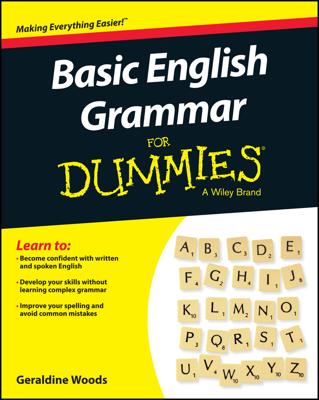How to identify the parts of speech
If you’re increasing your vocabulary and adding new words to your repertoire, you need to know the part of speech the words belong to so that you can use them correctly. The following list shows the eight parts of speech in English. Note that some words, like open or yellow, can be used as more than one part of speech.
-
Nouns: Words that name a person, place, thing, or idea (sofa, democracy)
Proper nouns — specific names of people and places, such as Peyton Manning and Indianapolis — are capitalized.
-
Pronouns: Words that take the place of a noun or another pronoun (I, you, me, he, she, it, we, who, they)
Possessive pronouns show ownership: my/mine, your/yours, their/theirs, our/ours.
-
Adjectives: Words that describe nouns and pronouns (red, more, second, several)
-
Verbs: Words that name an action or describe a state of being (run, seem)
-
Adverbs: Words that describe verbs, adjectives, or other adverbs (yesterday, below, happily, partly)
-
Conjunctions: Words that connect words or groups of words and show how they are related (and, or, for, but, after, although, because)
-
Prepositions: Words that link a noun or pronoun to another word in the sentence (by, about, behind, above, across, at, with)
-
Interjections: Words that show strong emotion (Oh! Wow!)
Prefixes that mean "not"
Expanding your vocabulary is made a little easier with tips that help you understand the meaning of new words. A prefix can often offer a clue to a word’s meaning, and in the case of the prefixes in the following list, the prefix makes the word mean the opposite of the root. All of the prefixes in the list mean “not” sometimes; a few of them have additional meanings:
-
A-: Atypical means not the usual.
-
Anti-: Antipathy means not with love.
-
Dis-: Disagree means not in harmony with.
-
Il-: Illegible means not readable.
-
Im-: Immodest means not shy.
-
In-: Individuality means not divided.
-
Ir-: Irremediable means not able to be corrected.
-
Un-: Unhappy means not content.
Common vocabulary prefixes — co-, de-, and in-
Adding to your vocabulary is easier if you know meaning of common prefixes, which help you understand the meaning of words. The following list contains three common prefixes and their meanings:
-
Co- means “with.” Variations include col-, com-, and con-. (cofounder, commemorate, concussion)
-
De- can mean “reduce,” “remove,” and “to get off of.” (decaffeinate, decapitate, deplane)
-
In- and its variations — em–, en–, il-, im-, and ir- — can mean “not,” “in,” “within,” “put into,” and “surround.” (incapable, enrage, impassioned)
Common vocabulary suffixes
When you’re stretching your vocabulary, pay attention to the endings of new words (their suffixes) for clues to their meaning. The following table lists common suffixes and their meanings:
| Suffix | Meaning | Examples |
|---|---|---|
| able/ible | capable or worthy of, fit for; tending to, causing, given to, or liable to |
commendable, edible, impressionable |
| d/ed | indicates past tense of a verb | baffled, flummoxed, wasted |
| ence/ance | quality or state; an action or process | clearance, reference, remembrance |
| ing | indicates the present-perfect tense of a verb (such verbs are called gerunds) |
admiring, discussing, perplexing |
| ion | act, result of an act, or state or condition | integration, obsession, possession |
| ment | an action, process, or act of a specified kind | bereavement, merriment, movement |
| s/es | indicates the plural form of a noun | analyses, arguments, results |
How to make vocabulary word flash cards
The simple act of writing down a new word and its definition can help you remember it. Vocabulary word flash cards are pretty easy to make and serve you and anyone else interested in building their vocabulary — just use the following steps:
-
Buy a stack of 3-by-5 index cards.
-
Write new words on the front of a card (one word per card).
-
Write the definition, part of speech, and pronunciation on the back of the card.
-
Take your cards with you and study them.
Reading tips to improve your vocabulary
You can build your vocabulary using flash cards, word games, and plain, old, everyday reading. Whether you’re reading cereal boxes, the newspaper, Web articles, office memos, or research papers, use the tips in the following list to improve your vocabulary as you read:
-
Read slowly.
-
Read confusing text over again.
-
Look at the pictures.
-
Create your own mental picture.
-
Summarize the main idea of the text in your own words.
-
Look up definitions of words you’re not familiar with or are uncertain about.

